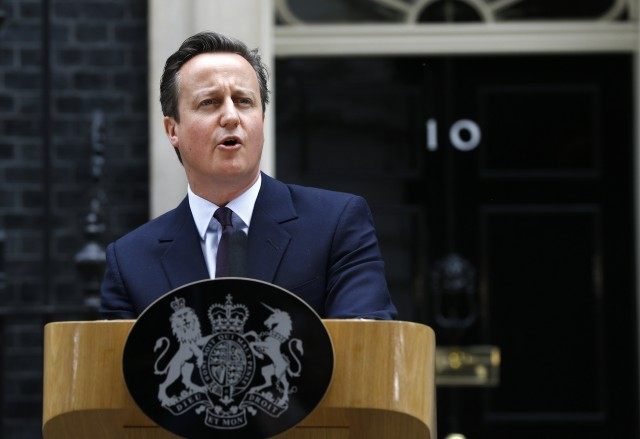David Cameron will stick to his promise to hold an In/Out referendum on Britain’s EU membership following his victory at the polls.
The Conservatives pledged to hold a vote in 2017 after they had renegotiated Britain’s terms of membership should they get a majority in Westminster.
And with pollsters embarrassed by their failure to predict middle England rising up to say no to Ed Miliband, the SNP, and another coalition, this is now looking easier than it may have been.
The EU referendum bill is expected to be tabled this month or next, allowing its progress through the House of Commons before the summer recess. The Tories will want to be quick off the blocks in order to take advantage of the disarray and navel gazing the other parties will be participating in as they prepare for leadership elections.
But there could still be a potential blockage in the House of Lords where life peers have ensured the benches are packed with New Labour luvvies and failed politicians as well as those on life pensions from Brussels. Should the Lords – who have previously voted against a referendum on EU membership thanks to the schizophrenic voting strategies of the Liberal Democrats – approve the Bill, it should receive Royal Assent by August at the latest.
News of the unexpected Conservative majority caused EU leaders to sit up with a jolt as they realised they may actually have to deal with two years of renegotiating and intense scrutiny from the British media. European Commission President Jean-Claude Juncker said he looked forward to meeting Mr Cameron soon and congratulated him on the results.
A spokesman said the European Commission “stands ready to work constructively with the new government.”
“President Juncker has repeatedly said that he wants a ‘fair deal with Britain’ and that the Commission will ‘examine in a very polite, friendly and objective way’ any ‘proposals, ideas or requests’ that the UK may put forward,” they added.
But while things may be relatively simple at home, it’s in Europe itself that the biggest challenge remains for Mr Cameron and Philip Hammond, who has been reappointed Foreign Secretary. While they look for serious concessions they can sell to the British voters, they will have to fit in with the EU’s focus on the Eurozone and its desperation to keep the single currency from failing.
At the summit of EU leaders on the 25/26 June, which will be Mr Cameron’s first as re-elected Prime Minister as well as leader of a majority government, focus will be on the ‘Four Presidents’ report’ on further Eurozone integration. Instead of being able to take the lead on the changes Britain wants, an area where Britain has no say will top the agenda.
But with other European general elections coming up later in the year, including Denmark in September and Poland in October, Mr Cameron may find himself with strong allies ahead of the October Leaders’ Summit where focus could turn to his reform agenda. He would do well to get negotiations off on a strong footing ahead of the Spanish elections expected in the months afterwards, where a centre-left government propped up by the far left would be an obstacle for reform particularly on Employment legislation and the principle of free movement and benefit entitlements.
As a backdrop to this international game of chess is the spectre of the European Court of Justice reminding the Conservatives that it is still the highest court in the UK. At some point it is set to rule on the UK right to reside test which will determine the access to benefits where a decision against the UK government would mean a major blow to Cameron’s ambitions to reform EU rules on migrants’ access to benefits.
The Prime Minister may not feel the pressure of UKIP breathing down his neck in Westminster following the party returning only one MP despite securing 3.8 million votes but there is little doubt that Nigel Farage and his party brought the change from huskies and hugging a hoody to Cameron demanding the ‘green crap’ cut from the manifesto and a strong line on EU reform and immigration. He may only face the intense glare of Douglas Carswell on the green benches, watching his every move, but UKIP still have the most MEPs in the European Parliament and when it comes to the intricacies of the European Union there’s no doubt Farage knows the system and has the contacts to make sure every slip up by the Prime Minister is spelt out in lights.
The UK will hold the rotating presidency of the European Union in the second half of 2017, giving it the opportunity to set the agenda for the six months it chairs the Council, but by then the British people will expect the work to have been done.
Only hours after the exit poll John Redwood, the veteran MP for Wokingham, said to avoid Brexit, Cameron must win big concessions.
Within minutes of the Conservatives winning he overall majority he went on TV to say, “The British people will leave the EU unless there is a sensible offer on the table.” With even Mr Redwood conceding that a treaty change is not on the cards, Mr Cameron has a tough battle on his hands over the next two years if he is to get more than cosmetic changes and satisfy his own backbenchers as well as the millions in the country who have said they want power back from Brussels to Westminster.

COMMENTS
Please let us know if you're having issues with commenting.